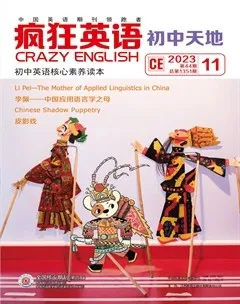Using Mobile Apps for Pocket Money“移动化”的零花钱

随着移动支付的发展,不少父母连给孩子零花钱都会通过手机来支付。有人说这能帮助孩子学会理财,但也有人担心这会让孩子养成过度消费的习惯。
Children may not be 1)stashing coins in piggy banks for muchlonger; with the move towards a cashless society, pocket money ismoving digital.
To reflect this trend, mobile budgeting apps for children has sprungup worldwide: GoHenry, Osper and Gimi to name a few.
These apps offer a simple money management service for children.Parents can add money to children’s accounts, set limits and 2)monitortransactions, while children can choose to save their money or spendit using a prepaid card that works like a debit card. The apps suggestminimum ages ranging from 6 to 9 for the prepaid card.
The companies behind the apps argue that in an increasinglycashless society, they can be a valuable way of teaching children aboutmoney.
Two thirds of adults globallyare financially 3) i l l i t e r a t e ,according to Standard & Poor’sGlobal Financial Literacy Survey,and one in four teenagers are unableto make even simple decisions on everydayspending.
These apps aim to overcome this, claiming to teach childrenfinancial concepts, such as budgeting, interest rates and income.
For instance, the Swedish app Gimi — with 1.2 million usersglobally — has virtual savings jars where children can deposMeOzuJu7QGToiRL37VDI06HQYd5ASufwCYpvvyL+wHw=it money;parents can pay children interest as they save; and there is a “chores”feature, where parents can pay children for completing household tasks.
“Cash was the best way to teach financial literacy, because it’s sotangible and so easy to grasp,” Philip Haglund says, CEO of Gimi. “Nowmoney is being transferred through some kind of cyberspace, which isreally abstract and hard for anyone to understand.”
Haglund believes the app can teach responsible spending habits,whereas schools tend to focus more on economic theory.
But Catherine Winter, managing director of financial capability atthe London Institute of Banking & Finance, warns that while digital toolscan help, there needs to be a more structured approach to financialeducation. The area should “have regular, dedicated classroom timeand ideally should be taught as a standalone subject”, she said. “Childrenwould then have the right context and foundation to get the most out ofboth the apps and their money.”
One concern is that introducing digital money apps to youngchildren could help to encourage irresponsible spending habits.
“If children don’t have a good foundation in financial capability,there’s a risk that money apps could be seen as just another game,”says Winter. “There’s a risk that they won’t learn about the real valueof money and might develop bad money habits.”
However, Haglund says children are protected from this asparents can monitor their spending habits and none of the servicesoffer an 4)overdraft so children cannot go into debt.
It is important for kids to learn and make mistakes, says AurelianGuichard, the product owner for Revolut Youth. “We want to help kidsand teenagers gain financial skills for life, and the earlier you do thatthe better, because if you’re going to make a mistake of £10 at 8, it’sbetter than making a mistake of £1,000 when you’re 28,” he says.
1) stash v. 存放;贮藏
2) monitor v. 监视;监控
3) illiterate adj. 了解不多的
4) overdraft n. 透支;透支额
孩子们今后可能不会再把零花钱存在存钱罐里了。随着无现金社会的发展,零花钱也在数字化。
为了紧跟潮流,全球出现了多个儿童移动理财应用程序,比如GoHenry、Osper 和Gimi 等。
这些应用程序为孩子们提供简单的理财服务。父母可以将钱存入孩子的账户,设定限额并监控交易,而孩子可以选择存钱或使用类似借记卡的预付卡消费。这些应用程序建议预付卡的最低使用年龄为6~9 岁。
开发这些应用程序的公司称,在一个越来越无现金化的社会里,这些应用程序可以成为一种教会孩子理财的宝贵方式。
根据标准普尔的全球金融素养调查,全球三分之二的成年人没有接受过金融教育,四分之一的青少年甚至无法对日常支出做出简单的决定。
这些应用程序旨在解决这一问题,声称能教会孩子们理财的概念,比如预算、利率和收入。
例如,瑞典的应用程序Gimi 在全球拥有120 万用户,它拥有虚拟存钱罐,孩子们可以在里面存钱,父母可以给孩子支付储蓄利息。它还有一个“家务”功能,父母可以付钱让孩子做家务。
Gimi 的首席执行官菲利普·哈格伦德说:“现金是教学金融知识最佳的方式,因为它是有形的,容易被人掌握。现在,钱通过网络转账,这真的很抽象,人们很难理解。”
哈格伦德认为,这款应用程序可以教学生养成负责任的消费习惯,而学校往往更关注经济理论。
但伦敦银行与金融研究所金融财力部门总经理凯瑟琳·温特警告称,尽管数字工具可能有所帮助,但金融教育需要一种更结构化的方法。这个领域应该“有固定的、专门的课堂时间,最好是作为一门独立的学科来教学”。她说:“这样一来,孩子们就有了合适的环境和基础来充分利用这些应用程序和他们的钱。”
有人担忧称,向儿童推出数字货币应用程序可能会助长不负责任的消费习惯。
温特说:“如果孩子们不具备良好的财务能力基础,那么这些应用程序就有可能被视为另一种游戏。他们有可能不了解钱的真正价值,并养成不良的消费习惯。”
然而,哈格伦德说,孩子们不会受此困扰,因为父母可以监督他们的消费习惯,而且没有任何一项服务能提供透支功能,这样孩子们就不会负债。
应用程序Revolut Youth 的产品负责人雷利安·吉查德说,对孩子来说,学习和犯错都很重要。他说:“我们想帮助孩子和青少年获得终生的理财技能,越早越好,因为如果你在8 岁时犯价值10 英镑的错误,总比你28岁时犯价值1000 英镑的错误要好。”

